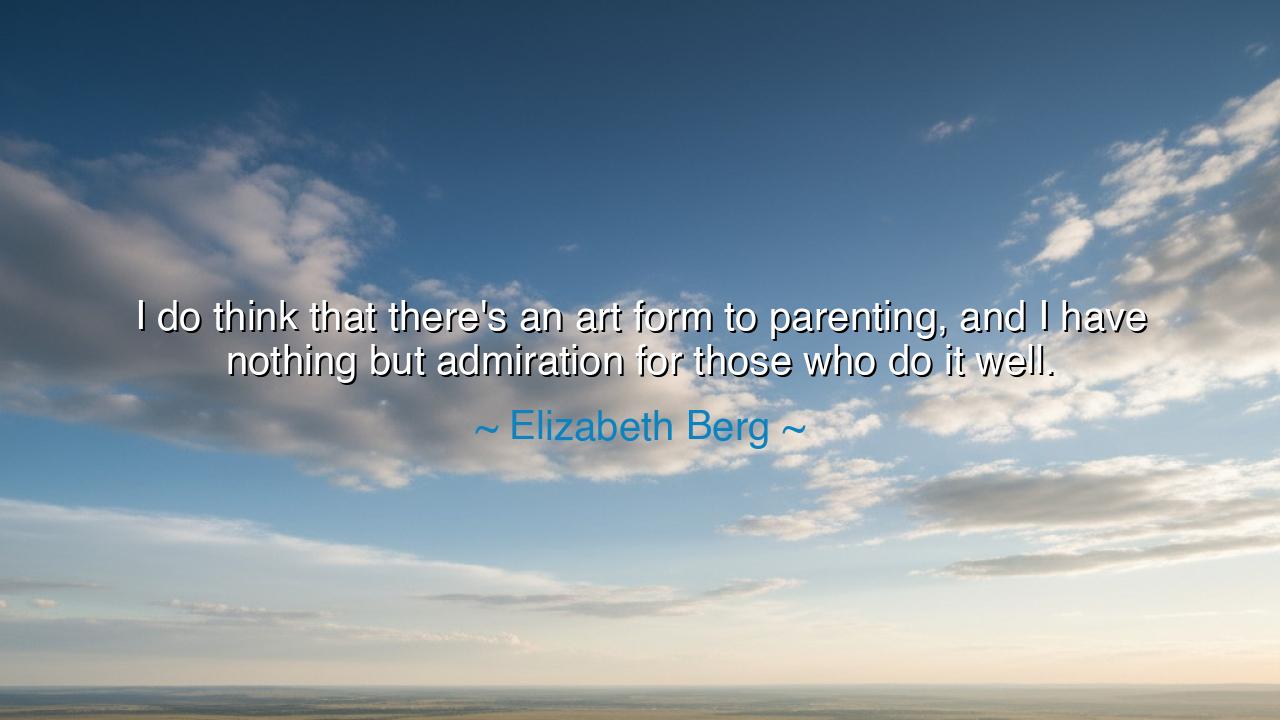
I do think that there's an art form to parenting, and I have
I do think that there's an art form to parenting, and I have nothing but admiration for those who do it well.






Elizabeth Berg, with the sensitivity of a writer who has spent her life observing the soul of human experience, once said: “I do think that there’s an art form to parenting, and I have nothing but admiration for those who do it well.” In this statement, she lifts parenting from the realm of mere duty or instinct and places it beside painting, music, and poetry. She declares it to be an art form, requiring vision, patience, practice, and a deep, creative love. For just as an artist shapes clay into form or sound into song, so too does the parent shape a life—an endeavor both sacred and perilous, for no medium is more fragile and no canvas more precious than the soul of a child.
The origin of these words can be found in Berg’s vocation as a novelist, one who knows the difficulty of creating beauty with discipline and care. Writing is not mechanical; it requires heart, patience, imagination, and craft. By likening parenting to art, Berg acknowledges that raising a child demands not rigid rules but a living, breathing sensitivity to balance, proportion, and improvisation. No two children are alike, just as no two works of art are alike. The parent, like the artist, must listen closely, observe deeply, and adapt constantly.
History offers us luminous examples of this truth. Consider Abigail Adams, who raised her children while her husband John was away founding a nation. Through her letters, she revealed her philosophy: nurture the mind with books, the soul with virtue, and the heart with tenderness. Her “art” of parenting produced John Quincy Adams, who became President, but more importantly, it produced a man of principle. Abigail’s work was no accident; it was as deliberate and creative as the brushstrokes of a master painter. Like Berg, we must admire those who can take the chaos of family life and shape it into harmony.
Berg’s words also rebuke the notion that parenting is a task one simply “gets through.” Too often society undervalues the quiet heroism of mothers and fathers, imagining their labor as ordinary. Yet Berg elevates it, calling it an art form—the highest form of creation, for what could be greater than forming a soul? To discipline without crushing, to guide without controlling, to love without smothering—these are refinements as delicate as the work of Michelangelo or Mozart. And those who achieve them, she says, deserve admiration, for their art is not hung in galleries but lives on in human beings.
Her insight also reminds us that art demands sacrifice. The sculptor spends hours bent over stone; the musician repeats scales until their fingers bleed. So too the parent spends sleepless nights, endless days, and countless sacrifices shaping their children. Yet just as the artist finds joy in their work despite the toil, the parent finds joy in the laughter, the growth, the love of their children. The true art of parenting lies not in perfection, but in devotion—the willingness to pour one’s whole being into the act of nurturing another life.
The lesson here is profound: treat parenting not as a chore, but as art. Approach it with reverence, patience, and creativity. Do not be afraid to experiment, to learn from mistakes, to change your strokes and your colors as the child grows. See your family not as a burden but as a masterpiece in progress, where each moment of love, each word of wisdom, each act of sacrifice is another brushstroke on the canvas of your child’s soul.
Therefore, let Berg’s words echo in our hearts: “There’s an art form to parenting, and I have nothing but admiration for those who do it well.” Let them remind us that those who dedicate themselves to this craft are not merely parents—they are artists of the highest order. And let us honor them, not with fleeting praise, but by striving ourselves to practice this art with courage, humility, and boundless love.






AAdministratorAdministrator
Welcome, honored guests. Please leave a comment, we will respond soon